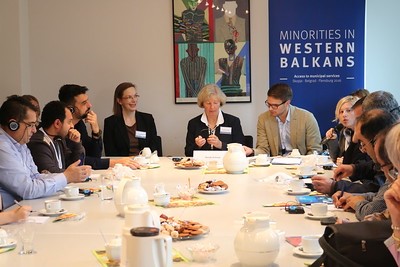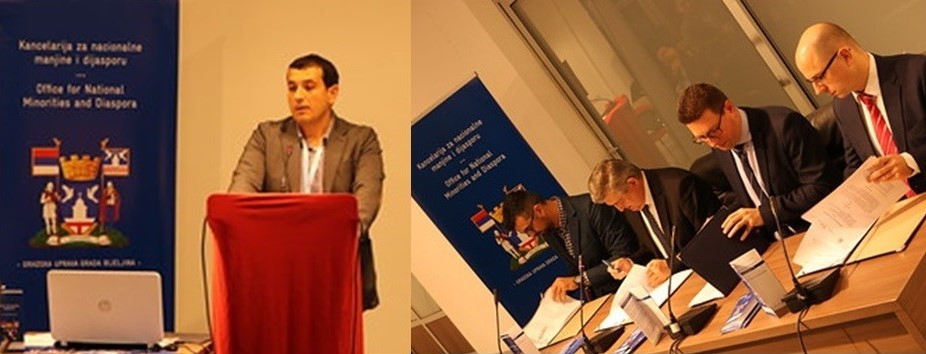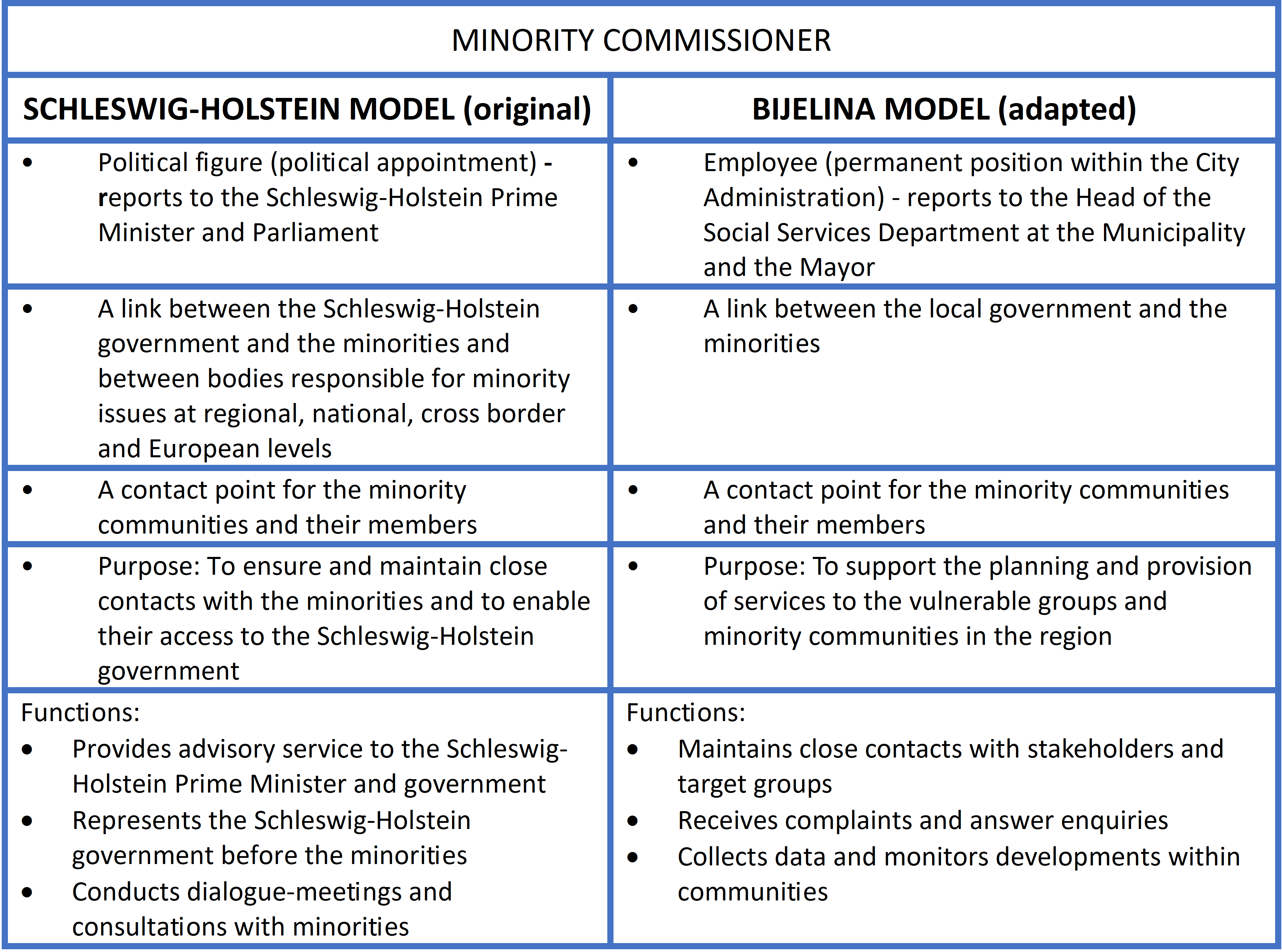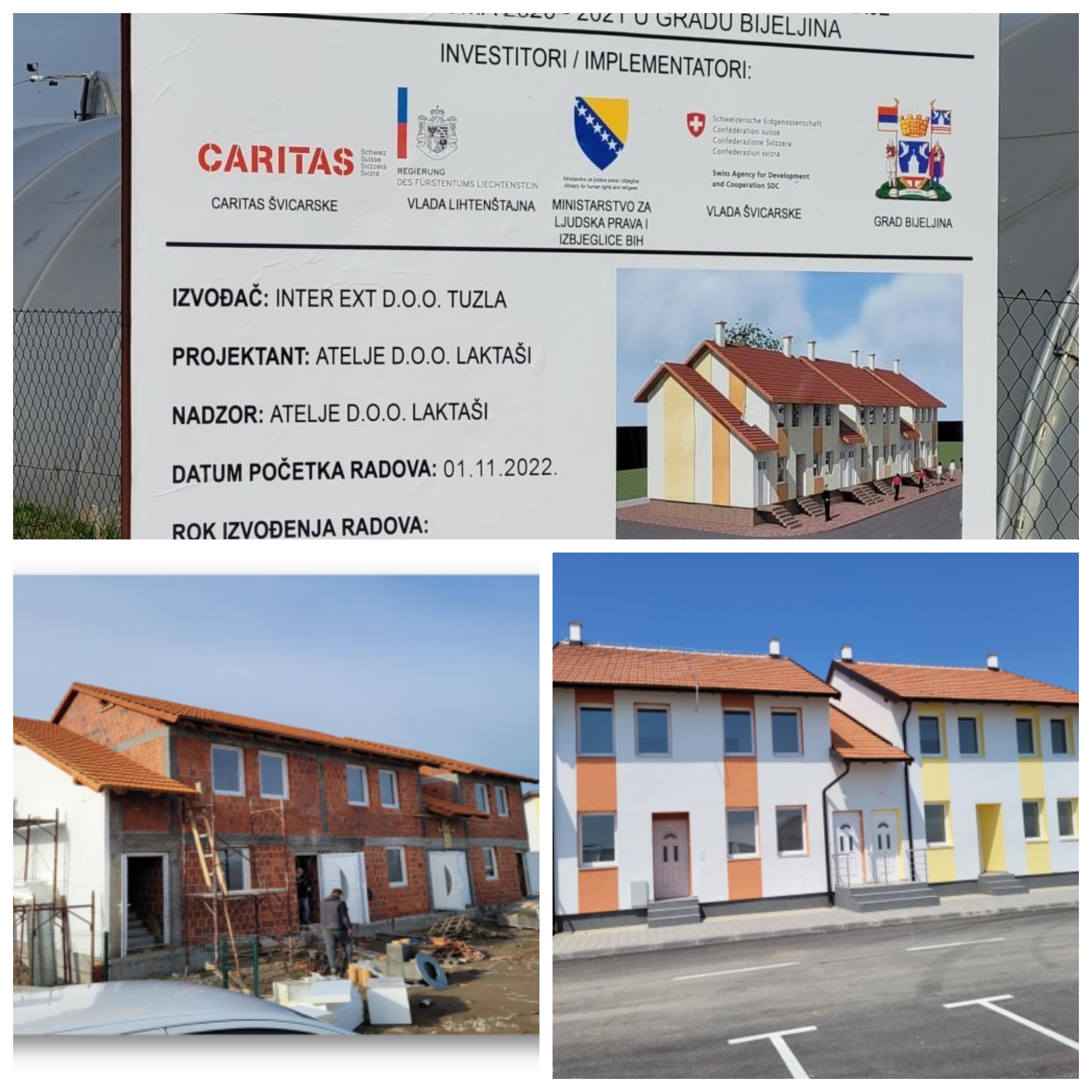THE IDEA
In 2016, the Deutsche Gesellschaft für Zusammenarbeit (GIZ) invited the Schleswig-Holstein Chancellery, the Federal Union of European Nationalities (FUEN) and the European Centre for Minority Issues (ECMI) to support the implementation of their Western Balkan programme Social Rights for Vulnerable Groups (SoRi) by raising the awareness of the local stakeholders about minority rights and positive models of diversity governance[1].
 Ms Renate Schnack, Minority Commissioner of Schleswig-Holstein and Ms Linda Pieper, Referent for the issues related to national minorities in the Schleswig-Holstein Chancellery, met the participants in the study visit in 2016 (photo: FUEN)
Ms Renate Schnack, Minority Commissioner of Schleswig-Holstein and Ms Linda Pieper, Referent for the issues related to national minorities in the Schleswig-Holstein Chancellery, met the participants in the study visit in 2016 (photo: FUEN)
The implementing partners designed the “Minorities in Western Balkans” project[2] to transfer knowledge and best practices for minority protection in the Western Balkans. The real “break-through” followed the study visit to Schleswig-Holstein in October 2016. Within those frameworks, the representatives of the Municipality of Bijeljina, the NGO OTAHARIN, and the social centre Bijeljina learned about the different models and instruments for engaging and supporting minorities in the northernmost German state. The direct contact with many relevant stakeholders during the stay in the region was very important for the delegates from the Western Balkans to understand how the mechanisms in place addressed identified specific needs of the German-Danish border and to inspire them to apply the approach to their local context.
With around 2500 citizens, Roma is the biggest minority community in Bijeljina, experiencing challenges regarding social protection, citizenship status, reintegration of returnees, school drop-outs, etc. With the knowledge and experience gained from the region of Schleswig-Holstein, NGO OTAHARIN came up with the idea to transfer and adapt the model of the Minority Commissioner and Office to the city of Bijeljina. Hence, in December 2016, the first concept note was drafted.
FROM INSPIRATION TO IMPLEMENTATION
Formed in early 2005 by the parents of Roma students and other citizens interested in the issue of Roma education in Bosnia and Herzegovina, the Association of Citizens for Promotion of Roma Education – OTAHARIN operates at the state level of Bosnia and Herzegovina. OTAHARIN aims to increase the educational, social and economic integration and inclusion of vulnerable and marginalized groups through professional, dedicated and innovative work, accountability and credibility. Since April 2022, to reflect the intensity of development and the broad scope of activities, the Association officially changed its name to the Centre for Integrative Inclusion of Roma men and women Otaharin.
Throughout 2017, the contacts between the NGO and FUEN intensified. Representatives from the NGO OTAHARIN, who expressed an interest in learning more about the work of FUEN, were invited to the 62nd FUEN Congress in Cluj-Napoca. Having the chance to meet and network with many other minorities and relevant stakeholders, they decided to apply for supportive membership (which was subsequently confirmed in September 2017).
With the FUEN support, through 2017, OTAHARIN gathered more information about the role of the Minority Commissioner in the German-Danish border region, the role of the NGOs and the proactive approaches to reaching out to the minorities. In July 2017, the implementation kick-off meeting took place in Bijeljina, involving both the local stakeholders (OTAHARIN, Municipality of Bijeljina and Bijeljina Social Centre) and the project implementing partners (GIZ, FUEN, Schleswig-Holstein and ECMI ). Based on the knowledge and experience gained from the first visit to the German-Danish border region, NGO OTAHARIN included in the preparatory planning activities such as networking with other minority NGOs from Bijeljina, awareness raising among the future end-users of the new services, establishment of contacts at ministerial and state level for defining the legal base for the position and promoting its importance. A significant role in the establishment of the position of Minority Commissioner in Bijeljina played by the Mayor, Mr Mićo Mićić, who not only supported the idea but also contributed to its establishment and sustainability by suggesting that the Municipality transform a working position within the Social Department to accommodate the new Minority Commissioner.
Apart from deciding upon the steps needed to transform the vision into reality and the respective timeframes, during the kick-off meeting, it was agreed that FUEN would organise an additional study visit for eight participants from Bijeljina– four representing the Municipality (including Mr Ljubiša Stanišić, the appointed future Minority Commissioner), two for the NGO OTAHARIN, and another two for the Social Centre Bijeljina. At the programme's core was the job shadowing at the Office of the Schleswig-Holstein Minority Commissioner. A “to-do list” was elaborated within the training framework, focusing on developing the future action plan. With a view to the mutual trust between the Schleswig-Holstein authorities and the NGOs, the training emphasised the importance of cooperation between civil society and the local and state-level public institutions.
The official inauguration of the new position of Minority Commissioner in Bijeljina Municipality took place on the International Day of Tolerance, 16th November 2017. At the opening ceremony, the Mayor, Mr. Mićo Mićić, reconfirmed his support to the Minority Commissioner in Bijeljina, whilst the FUEN President, Mr Loránt Vincze, encouraged the local partners to continue working on minority rights issues. The event was attended by local, national, and international stakeholders, including the Deputy Minister for Human Rights of Bosnia and Herzegovina, the Head of the Council of Europe Office in Sarajevo, and the Vice-President of Youth of European Nationalities.
THE ADAPTED MODEL
Established as a permanent structure to the Social Service Department of the Administration of the City of Bijeljina and headed by an Independent Associate for National Minorities and Diaspora, the mission of the Bijeljina Minority Commissioner was defined as to contribute to the inter-ethnic dialogue and social cohesion by supporting the members of the local minority communities to enjoy their rights and interact effectively with the public authorities. At the time of the official launch at the end of 2017, the local government elaborated and adopted an official legal document outlining the specific tasks of the new position. The job description provided that the Bijeljina Minority Commissioner will:
A key factor for the successful transfer of the structure was the political support provided by the Mayor of Bijeljina – Mr Mićo Mićić, whose proposal for embedding the new Office for National Minorities and Diaspora within the Social Department of the Municipality guaranteed the sustainability of the initiative. Furthermore, thanks to the public legitimacy of the Minority Commissioner, the model attracted the interest of other local governments in Bosnia and Herzegovina, as well as throughout the Western Balkans and the years it was multiplied (details provided below).

Official opening of the Office of Minority Commissioner in Bijeljina 2017. Mr Ljubiša Stanišić, together with FUEN President Mr Loránt Vincze, MEP, Mr Mičo Mičić, Mayor of Bijeljina, Mr Michael Samec, Project Leader of GIZ and Mr Dragan Joković, Director of NGO Otaharin (photo: FUEN)
To outline the contribution of the local stakeholders to the adaptation of the model by tailoring the position to the specific community needs, it needs to be highlighted that the Schleswig-Holstein Commissioner for Issues pertaining to National Minorities and Ethnic Groups, the Borderland and Low German is an advisor to the Minister-President of the State and has the rank of a State Secretary. The political position is a central contact point for the minorities in Schleswig-Holstein, connecting them with the state government. The table below offers a comparative overview of the key similarities and differences between the original Schleswig-Holstein model and its adapted version in Bijeljina.

IMPROVED SERVICES TO VULNERABLE GROUPS IN BIJEJINA
Accommodated by the Department of Social Services of the Bijeljina city administration, the new structure gained institutional legitimacy already with its inauguration at the end of 2017. The Office for National Minorities and Diaspora, hosting the position of the Minority Commissioner, has become an inseparable part of the local public administration. It was the first institutionalised structure in Bosnia and Herzegovina to support minority communities and vulnerable groups at the local level, whose work was included in the strategic development planning of the local authorities. The elaborated during the preparatory period Job specification for the position of Minority Commissioner[3] outlining its tasks and responsibilities and the appointment of Mr Ljubiša Stanišić have enabled the start of the work with the launch of the new service.
Between 2018 and 2021, the Bijeljina Office for Minorities and Diaspora has been focused on providing support mainly to Roma and Slovak minority representatives. The different needs of the two minorities required the development of different mechanisms to address them. The Slovak community was offered assistance related mainly to preserving and maintaining their cultural identity. However, the experienced by Roma community's problems with poverty, exclusion and discrimination, educational integration, and housing called for the development of a comprehensive support programme. In pursuit of its mission, the Minority Commissioner engaged with civil society representatives to update the new Local Action Plan for Roma Inclusion and its implementation over 2019-2023.[4] To support the Minority Commissioner in planning better the activities of the service and its targeted interventions, the Citizens Association “OTAHARIN” has been regularly gathering information about the needs of the Roma community through outreach work and has been sharing the findings with the Office for Minorities and Diaspora.
As an established partner to the Bijeljina City Administration and initiator of the transfer and adaptation of the Schleswig-Holstein model, the Citizen Association has been supporting the work of the Office for Minorities right from the start. Working at the grass-root level and being aware of the problems and the needs of the vulnerable groups, especially of the challenges for the local Roma community as one of the largest in Bosnia and Herzegovina, the involvement of OTAHARIN facilitated the contacts between the Minority Commissioner and the target groups. It enabled the new service to gain legitimacy among the stakeholders.
The partnership between the public authorities and civil society resulted in the new structure enjoying a credit of trust from both sides since its establishment. Nevertheless, additional efforts were needed to become a mechanism for the delivery of targeted support to the vulnerable groups in the region and to enable efficient cooperation between the service providers and the beneficiaries. Hence, efforts were directed towards fostering the dialogue between the public authorities, service providers, businesses, civil society, and the end-users and interconnecting them. Networking and promoting the office's work have become important aspects of the work of the Minority Commissioner over the past two years.
To raise awareness about the role and the functions of the new structure, the Office for Minorities has developed info-sheets to disseminate among the beneficiaries and info-sessions aiming to update the Roma stakeholders about the current developments and plans that have been established. Different stakeholders have been included in working groups and consultative bodies in the Office to improve communication between the parties. On numerous occasions, the Commissioner for Minorities has also participated in workshops and informational events organized by the Association “OTAHARIN” and, on behalf of the City Administration, supported initiatives such as marking of important days (e.g., 8th April; 5th November; etc.) and delivering campaigns against gender-based violence. It is particularly important to emphasize that the Commissioner for Minorities, on behalf of the City of Bijeljina, supported and attended the "BARO-DROM" festival of Roma culture, tradition, and language. This festival was held for the first time in Bosnia and Herzegovina in 2022, with the City of Bijeljina as the host. The support of the City of Bijeljina and the Commissioner for Minorities is reflected in including the "BARO-DROM" festival in the City of Bijeljina's Cultural Events Calendar from April to December 2022. Continuing their support, the City of Bijeljina, together with the Commissioner for Minorities, enabled OTAHARIN to organize the "BARO-DROM" festival during August 2023.
Promotion of the new structure at the regional and state levels was also significant for the Office to gain legitimacy and recognition for its work and potential impact in the future. The increased media attention to the supported by the GIZ transfer of the Schleswig-Holstein model to Bijeljina, as well as to the partnership established between the City Administration of Bijeljina and the Citizens Association OTAHARIN with the State Chancellery of Schleswig-Holstein and FUEN, was used to increase the public interest in the planned activities of the new Office. It must be noted that two years later, active outreach is still among the mechanisms used to promote the work of the Minority Commissioner and the LG’s continuous commitment to improving the situation of the vulnerable groups in the region. The political support provided by the Mayor of Bijeljina had a significant positive impact not only on the transfer and the initial establishment of the service but also on its recognition by stakeholders, partners, and donors. In the context of the political instability in Bosnia and Herzegovina, which often leads to minority issues being pushed to the bottom of the agenda of the public institutions, the fact that the new Bijeljina Mayor as of the end of 2020, Mr Ljubiša Petrović, reaffirmed the full support to the Office for Minorities, is a public recognition of the importance of the service and a factor for its sustainable development in the future.
The efficient cooperation between the public authorities, civil society, and stakeholders enabled the Office for Minorities to account for significant achievements for four years. Among them can be listed some initiatives addressing societal challenges in the fields of:
In January 2023, the representatives of the Bijeljina City Administration took part in a regional conference in Skopje, organised within the frameworks of the GIZ - Schleswig-Holstein Chancellery – NALAS project “Scaling up of minorities inclusion models and strengthening of service delivery in municipal structures in the Western Balkans”. Mr Ljubiša Stanišić, the Minority Commissioner from the Department of Social Affairs, presented the City’s dedication and commitment to cooperation, reconciliation and an active local minority or dialogue with the minorities. He pointed out that the Office for minorities and the Section for minorities and diaspora continues to contribute to the improvement of the intercultural dialogue at the local level and to the exercise of rights. In 2022, Mayor Ljubiša Petrović received the award “Mayor Friend of Roma” for the conducted awareness-raising campaign to change perceptions about Roma and foster their inclusion of Roma in the community. Setting up signs in the languages of minorities and developing the idea for shelter for children who are at risk from human trafficking were also listed among the Office initiatives and the City’s integral approach to social inclusion of Roma and other vulnerable groups.

Bijeljina Housing Project (photo: OTAHARIN)
As a result of the identified need to improve the planning and delivery of Municipal services to vulnerable groups through efficient communication and better contacts between the service providers and the beneficiaries, the position of the Minority Commissioner filled in an existing gap in the Bijeljina social service infrastructure. Sharing the feeling for ownership of the new mechanism for the provision of support to the vulnerable groups in the region, the Bijeljina City Administration and civil society have jointly engaged with the further development of the structure. They continue to work together to increase the number of stakeholders (Roma) involved in the Office initiatives and fight against Antigypsyism. The vision for the future development of the Bijeljina office includes widening the scope of work (to cover other minorities, target groups, and thematic areas of intervention), strategic planning of services and building the capacities of the Office as a service provider and key actor in fostering the delivery of targeted support to the minorities in the region.
CONCLUSIONS
The success story with the transfer and adaptation of the Schleswig-Holstein model of Minority Commissioner to the city of Bijeljina, Bosnia and Herzegovina, can be viewed as an isolated case of a project achievement rather than as a regular international practice. What is important, however, is to look beyond the concrete example and pay attention to the structural factors that have contributed to the vision to become a reality regardless of the differences in the legal, political, and social contexts in the two states:
RESOURCES
[1] The compilation is based on the “Handbook on Minority Institutions in Schleswig-Holstein: Transfer of Models to the Western Balkans”, 2016, available at: https://fuen.org/assets/upload/editor/docs/doc_yi5wb21T_Handbook_Minority_Institutions_in_SH.pdf and 2021 FUEN Analysis Report “From Transfer of Models Towards their Multiplication”, available at: https://fuen.org/en/article/Publications , developed within the frameworks of the Minorities in the Western Balkans project (Phase#1 2016-2017 and Phase#2 2018-2021), as a part of the regional project Social Rights for Vulnerable Groups (SoRi), implemented by the Deutsche Gesellschaft für Internationale Zusammenarbeit (GIZ) on behalf of the German Federal Ministry for Economic Cooperation and Development (BMZ)
[2] The project “Minorities in the Western Balkans” was launched in 2016, within the frameworks of the GIZ Social Rights for Vulnerable Groups (SoRi) Programme 2015-2019, covering Albania, Bosnia and Herzegovina, Kosovo*, North Macedonia, and Serbia (https://www.giz.de/en/downloads/015_RP_SocialRights_EN.pdf)
[3] The document is provided in the Annex to the Report.
[4] The Bijeljina Local Action Plan for Roma Integration 2019-2023 is provided in the Annex to the Report